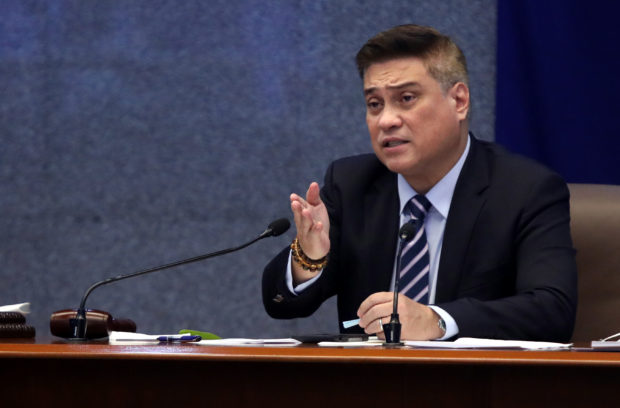
Senate President Juan Miguel Zubiri (File photo from the Senate Public Relations and Information Bureau)
MANILA, Philippines — The proposed creation of a Maharlika Investment Fund (MIF), though a priority bill, won’t be rushed so that it can go through proper scrutiny and amendments in the Senate, Senate President Juan Miguel Zubiri said on Tuesday.
Zubri said he had instructed Sen. Mark Villar — the prime mover of the fund in the chamber — to allot time to hear the insights of various sectors during weekly hearings, regardless of whether they were in favor or opposed to the bill.
“In other words, don’t rush this,” Zubiri, speaking in a mix of English and Filipino, said at a press briefing.
He also told Villar to draft a committee report before the Senate break by the end of March, so other senators could study it and have “a full debate on the issue” upon the chamber’s resumption of their session after the Holy Week break.
“We in the Senate will not rush this measure and will make sure that all points are covered to make sure we don’t make mistakes,” Zubri said.
President Ferdinand Marcos Jr. certified as urgent the MIF bill in the House of Representatives, which was filed by his son, Ilocos Norte Rep. Sandro Marcos, and his cousin, Speaker Ferdinand Martin Romualdez.
The House swiftly passed the bill in only 17 days. But it was later tweaked to entice foreign investors, according to Albay 2nd District Rep. Joey Salceda.
Marcos has since called on the Senate to “examine closely” the MIF bill “so that we will have a good law.”
According to Zubiri, the Senate “will propose a lot of perfecting amendments to the House version.”
“There are those in the House who want to amend it. So it’s a work in progress. That’s what I would say. The MIF is a work in progress. That House version is a good base to discuss and to debate on, and we will of course, give out perfecting amendments,” Zubiri said.
Asked if the MIF will pass in the Senate, Zubiri said: “It will get the number of votes required, which is a majority vote on this particular issue.”
The House bill initially included President Ferdinand Marcos Jr. as the head of the fund’s advisory board. But that was removed from the version that was passed by the lower chamber.
“The president will no longer be involved in this — although the president has the power to remove members of the board if there’s corruption or an issue of mismanagement. They can be removed by the President,” Zubiri said.